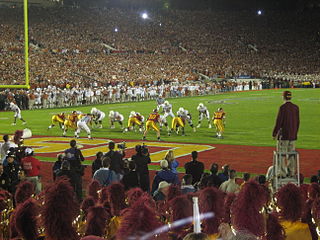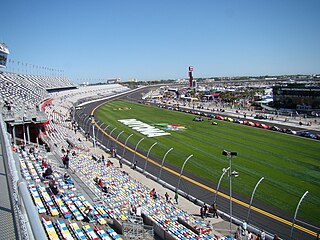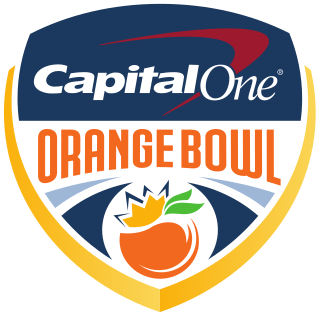Related Research Articles

The Sugar Bowl is an annual American college football bowl game played in New Orleans, Louisiana. Played annually since January 1, 1935, it is tied with the Orange Bowl and Sun Bowl as the second-oldest bowl games in the country, surpassed only by the Rose Bowl Game.

The Citrus Bowl is an annual college football bowl game played at Camping World Stadium in Orlando, Florida. The bowl is operated by Florida Citrus Sports, a non-profit group that also organizes the Cheez-It Bowl and Florida Classic.

The Bowl Championship Series (BCS) was a selection system that created five bowl game match-ups involving ten of the top ranked teams in the NCAA Division I Football Bowl Subdivision (FBS) of American college football, including an opportunity for the top two teams to compete in the BCS National Championship Game. The system was in place for the 1998 through 2013 seasons and in 2014 was replaced by the College Football Playoff.

The Miami Orange Bowl was an outdoor athletic stadium in Miami, Florida from 1937 until 2008. Located in the Little Havana neighborhood west of Downtown, it was considered a landmark, and was the home stadium for the Miami Hurricanes college football team, and the professional Miami Dolphins for their first 21 seasons, until the opening of Joe Robbie Stadium in nearby Miami Gardens in 1987. The stadium was the temporary home of the FIU Golden Panthers while its on-campus venue, now known as Riccardo Silva Stadium, underwent expansion during the 2007 season.

In North America, a bowl game is one of a number of post-season college football games that are primarily played by teams belonging to the NCAA's Division I Football Bowl Subdivision (FBS). For most of its history, the Division I Bowl Subdivision had avoided using a playoff tournament to determine an annual national champion, which was instead traditionally determined by a vote of sports writers and other non-players. In place of such a playoff, various cities across the United States developed their own regional festivals featuring post-season college football games. Prior to 2002, bowl game statistics were not included in players' career totals and the games were mostly considered to be exhibition games involving a payout to participating teams. Despite attempts to establish a permanent system to determine the FBS national champion on the field, various bowl games continue to be held because of the vested economic interests entrenched in them.

The Miami Hurricanes football team represents the University of Miami in the sport of American football. The Hurricanes compete in the National Collegiate Athletic Association (NCAA)'s Division I Football Bowl Subdivision (FBS) and the Coastal Division of the Atlantic Coast Conference (ACC). The program began in 1926 and has won five AP national championships.

The 2004 NCAA Division I-A football season was the highest level of college football competition in the United States organized by the National Collegiate Athletic Association (NCAA). The regular season began on August 28, 2004 and ended on December 4, 2004. The postseason concluded on January 4, 2005 with the Orange Bowl, which served as the season's BCS National Championship Game.
The 1986 NCAA Division I-A football season ended with Penn State winning the national championship. Coached by Joe Paterno, they defeated Miami (Fl) 14–10 in the Fiesta Bowl. This Fiesta Bowl was the first in the game's history to decide the national championship, launching it into the top tier of bowls.
The 1983 NCAA Division I-A football season ended with the University of Miami, led by Bernie Kosar, winning their first national championship over perennial power and top ranked Nebraska in the Orange Bowl.

The Florida Gators football program represents the University of Florida (UF) in American college football. Florida competes in the Football Bowl Subdivision (FBS) of the National Collegiate Athletic Association (NCAA) and the Eastern Division of the Southeastern Conference (SEC). They play their home games in Steve Spurrier-Florida Field at Ben Hill Griffin Stadium on the university's Gainesville campus.
The 1962 Miami Hurricanes football team represented the University of Miami as an independent during the 1962 NCAA University Division football season. Led by 15th-year head coach Andy Gustafson, the Hurricanes played their home games at the Miami Orange Bowl in Miami, Florida. Miami finished the season 7–4. The team's offense scored 189 points while the defense allowed 217 points. The Hurricanes competed in the final Gotham Bowl, held at Yankee Stadium. Just 6,166 people came to the game, in which the Nebraska defeated Miami, 36–34. It was the only college bowl game ever played at the stadium.

The U.S. state of Florida has three National Football League teams, two Major League Baseball teams, two National Basketball Association teams, two National Hockey League teams, two Major League Soccer teams and 13 NCAA Division I college teams.
Wide Right II is a colloquial name for the 1992 college football game between the Miami Hurricanes and Florida State Seminoles. The game is notable in the Florida State–Miami football rivalry and derives its name from the colloquial name Wide Right I, played during the immediately preceding season. Like its predecessor, the game had decisive national championship implications and ended with a Florida State kicker missing a game-altering field goal in the waning seconds.

The Orange Bowl is an annual American college football bowl game played in the Miami metropolitan area. It has been played annually since January 1, 1935, making it, along with the Sugar Bowl and the Sun Bowl, the second-oldest bowl game in the country, behind the Rose Bowl. The Orange Bowl is one of the New Year's Six, the top bowl games for the NCAA Division I Football Bowl Subdivision.

The 1981 Miami Hurricanes football team represented the University of Miami during the 1981 NCAA Division I-A football season. It was the Hurricanes' 56th season of football. The Hurricanes were led by third-year head coach Howard Schnellenberger and played their home games at the Orange Bowl. They finished the season 9–2 overall.
The 2016–17 NCAA football bowl games were a series of college football bowl games which completed the 2016 NCAA Division I FBS football season. The games began on December 17, 2016, and aside from the all-star games ended with the 2017 College Football Playoff National Championship which was played on January 9, 2017.
The 2016 Orange Bowl was a college football bowl game played on December 30, 2016 at Hard Rock Stadium in Miami Gardens, Florida, played between the Michigan Wolverines of the Big Ten Conference against the Florida State Seminoles of the Atlantic Coast Conference (ACC). It was one of the 2016–17 bowl games that concluded the 2016 NCAA Division I FBS football season. Florida State won the game by a score of 33–32. Dalvin Cook, running back for the Seminoles, was named the game's MVP.
The 1932 Miami Hurricanes football team represented the University of Miami as a member of the Southern Intercollegiate Athletic Association (SIAA) in the 1932 college football season. The Hurricanes played their home games at Moore Park in Miami, Florida. Led by second-year head coach Tom McCann, the Hurricanes finished their season 4–3–1 and were invited to the first annual edition of the Festival of Palms Bowl, where they defeated the Manhattan Jaspers by a score of 7-0.
The 2017–18 NCAA football bowl games was a series of college football bowl games which completed the 2017 NCAA Division I FBS football season. The games began on December 16, 2017, and aside from the all-star games ended with the 2018 College Football Playoff National Championship which was played on January 8, 2018.
References
- ↑ Bowl Games: College Football's Greatest Tradition, by Robert Ours, 2004, pg. 28